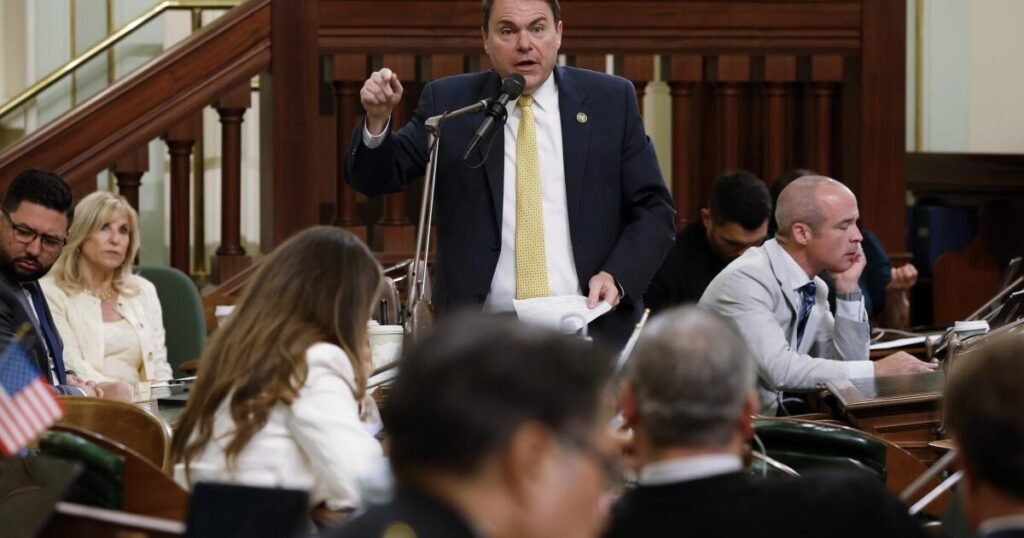Sacramento – Special Election Approved
On Thursday, California lawmakers greenlighted a special election in November, ramping up the pressure in the intensifying fight for control of Congress.
Backed by Governor Gavin Newsom and various Democratic leaders, this voting measure represents a crucial step in a broader political struggle over electoral maps that could significantly influence the 2026 midterm elections and the balance of power in the U.S. House.
If the new district map is approved on November 4th, it could tilt outcomes further in favor of California’s Democrats while potentially reducing the number of Republican seats from the state.
Initially, Newsom suggested these new districts would only come into play if another state also redrew its lines before 2031. However, the Democrats have since removed the so-called “trigger” language, meaning that if voters give their approval, the new boundaries will take effect regardless.
The voting proposal has garnered support from most Congressional and Senate Democrats and calls for California voters to override independent district commissions, which they currently dominate.
Interestingly, California legislators can amend statewide voting rules without needing the governor’s agreement. Still, Newsom is likely to sign two bills later Thursday regarding funding special elections and establishing the new council district lines.
This sudden push by Democrats diverges from a 15-year precedent in California, which relied on nonpartisan methods for district changes—a system recognized as a benchmark nationally. Voters previously took the power to redraw district lines away from lawmakers during the Great Recession, delegating it to an independent panel that used a lottery system.
Democrats argue that these changes are a necessary response to shifting political landscapes. After years of redistricting in Republican-led states, President Trump’s administration notably relied on these practices to help secure GOP control in the House.
Assembly Speaker Robert Rivas commented, “We are not mere bystanders. California is taking action in defense of our democracy.”
On the other side, some Republicans criticized Newsom’s rationale for fighting back against redistricting efforts as dangerous. They argue that retaliating undermines the independent processes Californians have chosen through previous elections.
“If you start fighting fire with fire, you risk burning everything down,” said James Gallagher, the Republican minority leader. He also denounced Trump’s moves to influence redistricting in Texas and viewed Newsom’s actions as a mirror of that strategy.
Senator Lena Gonzalez (D-Long Beach), involved in crafting the legislation, stated that not responding to the harm inflicted by the Trump administration is simply not an option.
Senate Minority Leader Brian Jones (R-Santee) referred to the proposal as a “corrupted rezoning plan” that went against California’s constitutional principles. He criticized the haste with which Democrats are pushing it forward.
Three Congressional Democrats abstained from voting on the constitutional reform. Jasmeet Baines, running for office against a Republican, notably voted against it, while others chose not to cast their votes.
Experts have indicated that Democrats will face significant challenges in their messaging about the November vote. Some have suggested that the proposed changes could undermine voter trust and call into question the integrity of democracy itself.
Background of the Situation
The pressure for new redistricting in Texas began with Trump’s team early in June, as they aimed to redraw the state’s Congressional districts. This would ideally give Republicans a more favorable chance in 2026.
Texas Republicans grew concerned that changes to their districts might endanger their re-election prospects. Nonetheless, following the White House’s suggestions, Governor Abbott introduced a new Congressional route.
As this drama unfolded in Texas, Newsom began discussing ways for California to respond effectively. Notably, Texas Democrats had briefly fled the state to deny a quorum necessary for Republicans to move forward with redistricting plans.
Amidst these events, a consultant linked to California House Democrats began drafting a map that could further weaken Republican representation in Congress.
Republicans in other states have also started considering similar redrawing efforts, with some states, such as Indiana and Florida, weighing options as tensions rise over political boundaries.
In California, voters have already received campaign mail against the measure, warning that these changes could dilute democracy and threaten California’s election process. Legal challenges are now a certainty, both in California and in states undergoing redistricting.
Republicans are preparing to challenge the voting bill in state court and are also looking at the potential for federal litigation if the new lines are approved.







